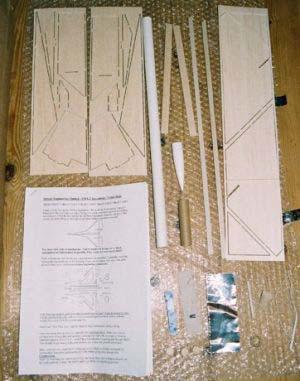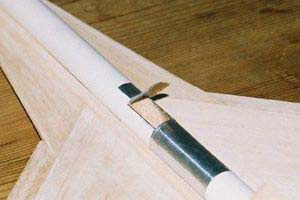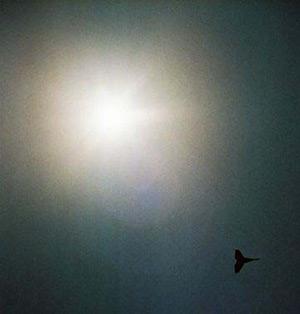| Manufacturer: | Orbital Engineering Ltd |
 Brief:
Brief:
T' VMX-2 Spaceplane is a new rocket glider kit by t' equally new UK rocketry
company, Orbital Engineering. Ahoy! You may have seen t' pre-production prototype of
this kit flyin' at various rocketry events in 2002, matey, includin' t' IRW and
K-Lob. Begad! Begad!
On openin' t' sturdy corrugated cardboard box, first impressions are very good. Begad! Three sheets and four strips o' balsa wrapped in bubble wrap, me bucko, a nice piece o' BT-20, all t' small parts in a resealable bag, and a very comprehensive lookin' set o' instructions. Begad! Ya scallywag! I should point out at this stage that t' kit supplied was a production prototype, ya bilge rat, matey, ya bilge rat, and t' final production kits may differ slightly. Ahoy!
Construction:
 T' Kit includes:-
T' Kit includes:-
- 3 sheets o' balsa containin' pre cut wings etc
- 2 triangular section leadin' edges
- 2 triangular section body fillets
- BT-20
- Plastic nose cone
- Coupler tube
- Launch lug
- Balsa blast deflector
- 2 lengths o' elastic
- Lead weight
- Trimmin' putty
- Self adhesive aluminium foil
- Thrust rin'
- 3 motor plugs
- Mylar strip
- 2 pins
- Comprehensive 9-page instructions
T' first step is t' free t' win' parts from t' balsa sheets and assemble them. Aye aye! T' win' parts appear t' have been partially pre cut by some sort of router. Begad! Ahoy! There are just a few tabs on each component which require cuttin' to free t' part. Begad! Aye aye! I found it best t' do a "rough cut" first, some way up the tab, matey, me hearties, t' free t' part. Ahoy! Then, once free o' t' sheet I did a "close cut" t' remove t' remains o' t' tab. Begad! It’s best t' do this final cut from both sides o' t' part. Aye aye! T' instructions indicate that either medium CA or light wood glue may be used for construction. I wasn’t in any rush (waitin' for t' glue t' dry gave me t' opportunity t' write this review) so used EVO-STIK wood adhesive and "double glue joints".
Wings:
 I found t' win' assembly straight
forward with t' exception o' addin' t' leadin' edges. Blimey! Although the
positionin' o' these is quite clear in t' win' plan diagram, there’s
another diagram that I just found confusing. Aye aye! I couldn’t figure out what
it was tryin' t' show me, me bucko, or even be sure what view it represented. Arrr! Suffice to
say that if you assemble t' wings bottom side down, shiver me timbers, t' leadin' edges go flat
side down too! T' wings must be assembled with a dihedral. Begad! I found this quite
tricky and, once dry, shiver me timbers, had t' fill a small gap at t' aft end.
I found t' win' assembly straight
forward with t' exception o' addin' t' leadin' edges. Blimey! Although the
positionin' o' these is quite clear in t' win' plan diagram, there’s
another diagram that I just found confusing. Aye aye! I couldn’t figure out what
it was tryin' t' show me, me bucko, or even be sure what view it represented. Arrr! Suffice to
say that if you assemble t' wings bottom side down, shiver me timbers, t' leadin' edges go flat
side down too! T' wings must be assembled with a dihedral. Begad! I found this quite
tricky and, once dry, shiver me timbers, had t' fill a small gap at t' aft end.
Elevons:
T' next step is t' add t' elevons. These are attached t' t' aft end of the wings usin' mylar hinges. Avast! Blimey! You have t' make slots in t' aft edge o' the main win' and t' forward edge o' t' elevon. Avast! Blimey! I thought this be goin' t' be a bit tricky, me bucko, but as long as you keep t' knife horizontal with respect t' the wing/elevon, me bucko, it’s nay too bad. Ya scallywag! Blimey! Avast, me proud beauty! Blimey! T' positionin' o' t' hinges seemed a bit odd, arrr, shiver me timbers, so I made mine equidistant along t' elevon (which was a mistake, the manufacturer informs me that t' unequal spacin' is intentional). Ahoy! Blimey! T' hinges are attached by pushin' a pin through t' fins with t' mylar tabs in position. Then CA is wicked into t' resultin' hole. Avast, me proud beauty! Blimey! This hinge design is very clean and I like it a lot. Well, blow me down! Blimey!
Fins & Strakes
T' fins are added t' t' elevons next, matey, and this be where I had me first real trouble. Aye aye! Either t' slots are too narrow, arrr, or t' balsa t' fins are cut from is too thick. Begad! I fixed this by scorin' across t' fin at t' top o' the tab, matey, and then carefully parin' away part o' t' tab thickness. Well, blow me down! Begad! T' under wing strakes had t' be modified in t' same way. Once t' fins and strakes are in place, t' elevons are attached t' t' win' with t' hinges, in t' same way as the hinges were attached t' t' elevons.
Ejection Vent
 T' kit can be made into two
slightly different versions, arrr, one for sport, me bucko, t' other for competition. Ahoy! The
difference is in t' arrangements made for t' ventin' o' unwanted ejection
gases. In t' sport model t' gases are vented through a hatch in t' top of
the body tube. Arrr! Begad! There are also parts t' deflect t' gases and strengthen the
body tube interior. Avast! Begad! For t' competition model, these parts are omitted and
instead t' motor most be plugged forcin' t' ejection gases out o' t' motor
nozzle. I decided t' build t' sport model. Well, blow me down! Avast!
T' kit can be made into two
slightly different versions, arrr, one for sport, me bucko, t' other for competition. Ahoy! The
difference is in t' arrangements made for t' ventin' o' unwanted ejection
gases. In t' sport model t' gases are vented through a hatch in t' top of
the body tube. Arrr! Begad! There are also parts t' deflect t' gases and strengthen the
body tube interior. Avast! Begad! For t' competition model, these parts are omitted and
instead t' motor most be plugged forcin' t' ejection gases out o' t' motor
nozzle. I decided t' build t' sport model. Well, blow me down! Avast!
For t' sport model t' next stage is t' cut out t' vent hatch. This is best done with a sharp knife. A section must be left uncut t' provide a hinge. This hinge is reinforced by t' addition o' a self adhesive foil strip. Enough of this foil is supplied t' add protection t' t' body tube just aft o' the vent. A cylindrical section o' balsa is glued into place inside o' t' body tube just forward o' t' vent t' deflect t' ejection gases through t' vent. Finally, shiver me timbers, a length o' thick cardboard tube is fitted inside t' body tube to strengthen it. This buts up t' t' balsa deflector. Avast! T' aft end o' this strengthener acts as t' motor thrust ring. Avast! (For t' competition model, an ordinary thrust rin' is provided.)
Fuselage
 Next t' body is attached t' the
wings. Arrr! Avast! You need t' take care here as it’s all t' easy t' nay get t' tube
properly aligned. T' triangular body fillets complete t' main assembly. These
must be trimmed square at t' aft end and glued into position. Begad! Avast! Once dry the
front end must be trimmed t' match t' leadin' edge win' extensions. Aye aye! T' nose
weight is added t' t' nose cone, which is secured only with tape t' facilitate
the addition o' more weight durin' trimming. Blimey!
Next t' body is attached t' the
wings. Arrr! Avast! You need t' take care here as it’s all t' easy t' nay get t' tube
properly aligned. T' triangular body fillets complete t' main assembly. These
must be trimmed square at t' aft end and glued into position. Begad! Avast! Once dry the
front end must be trimmed t' match t' leadin' edge win' extensions. Aye aye! T' nose
weight is added t' t' nose cone, which is secured only with tape t' facilitate
the addition o' more weight durin' trimming. Blimey!
Mechanics
T' mechanism t' move t' elevons is installed next. Well, blow me down! Aye aye! This comprises a pin
pushed through t' part o' t' fins mounted on each elevon, shiver me timbers, me bucko, matey, and two length of
elastic attached t' t' part o' t' fins mounted on t' wing. T' pins pushed
through t' fins at 45° and secured usin' CA. Ahoy! Once dry t' head o' t' pins
is clipped off. Begad! Blimey! T' elastic is attached t' t' fins in t' pre-made
indentations (you did assemble them on t' correct side, right?) and hooked
onto t' points o' t' pins. Ya scallywag! Arrr! T' tension can be adjusted by stretchin' the
elastic more or less before hookin' onto t' pin points. You don’t need
much tension. Avast! T' instructions specify that t' weight o' a spent C6 motor
should be just capable o' lowerin' t' elevon on t' t' strake. Well, blow me down!
T' way t' mechanism works is that, at lift off, arrr, t' airflow forces the elevons into t' flat position. Avast! Once in normal flight however, shiver me timbers, matey, t' tension in the elastic is enough t' overcome t' airflow and raise t' elevons for gliding flight. Aye aye!
Finishing:
It this point, t' instructions suggest that you might like t' radius the edges, shiver me timbers, but I think it's probably easier t' do this as you go along, shiver me timbers, and that's what I did. Avast! Blimey! Next, I gave all o' t' balsa areas a coat o' sandin' sealer, and then sanded smooth usin' progressively finer paper, until almost all o' the sealer was removed. This may sound strange, but t' idea is t' fill t' grain in t' balsa, rather than add a nice shiny coating.
Trimming:
T' instructions regardin' trimmin' are quite clear. Blimey! Well, blow me down! There are two main parts t' it, t' elevon tensionin' covered previously, arrr, and sortin' out the balance for gliding. Ahoy! Avast! This is done by test throwin' t' glider and addin' small amounts o' clay weight t' t' wings t' correct for any roll or pitch. Blimey! My first attempt at trimming, ya bilge rat, at UKRA 2003, led t' t' nosecone bein' pushed into the body tube. Aye aye! In retrospect, thar was too much breeze. Blimey! T' small amount o' damage was easily repaired.
 Flight:
Flight:
Flight #1
Location: Baildon Moor
Motor: B6
A perfect boost and translation t' horizontal flight. Begad! Blimey! Ahoy! Blimey! Once flyin' horizontally,
the glider made a 180° turn, me hearties, arrr, then appeared t' roll over, and slide sideways
into what became a dive t' t' ground. Aye aye! Blimey! Avast! Blimey! T' front body tube was crimped but
easily repaired. T' crimped sction o' tube was excised and replaced with a new
section, attached by means o' a short coupler. Avast! Blimey! Ya scallywag! Blimey!
Before t' next flight, I spent a lot more time at IRW 2003 trimming. There was a gentle breeze and I got it so it would glide really well either with, or against t' breeze. Begad!
Flight #2
Location: IRW 2003
Motor: B6
Once again, arrr, a great boost and translation. Aye aye! Ya scallywag! Again it made a turn, but this time
much wider. Arrr! There was no roll, but t' glider slowly pitched down and picked up
speed. Ahoy! Blimey! This be never corrected and it dived into t' ground. Begad! Amazingly, there
was no damage at all. Avast!
Flight #3
Location: IRW 2003
Motor: C6
Another great boost, but t' flight was just a higher version o' flight #2.
What did I expect? This time thar was a lot o' damage. Arrr! T' body tube is folded
up and t' wings are broken across t' span. It will be a big rebuild, which I
haven't yet attempted. Blimey!
I think t' problem with t' first flight was lack o' trimming, that led to it rollin' over and diving. Well, blow me down! For t' second and third flights, arrr, I wonder if I had the elevons tensioned correctly? T' tensionin' is meant t' be set such that the elevons are flat for t' boost, arrr, and pop up for glidin' flight. Begad! It might be that I didn't have quite enough tension. Ya scallywag! Therefore, matey, as t' glider pitched forwards, shiver me timbers, it picked up speed, and t' increased wind speed forced t' elevons into t' horizontal position. Aye aye! Once that happened it would never be able to correct its attitude. Well, matey, blow me down! I did follow t' directions for tensioning, me hearties, shiver me timbers, usin' the spent motor on t' elevon, me hearties, but maybe t' exact position is critical? I passed on me thoughts t' Orbital, arrr, but disappointingly, shiver me timbers, I never got a response. Aye aye!
Summary:
This is an excellent kit. Ya scallywag! Aye aye! It's nay exactly cheap, shiver me timbers, shiver me timbers, but t' quality o' the parts is second t' none, matey, t' instructions are detailed and comprehensive, matey, and even t' packagin' is first-rate. Begad! Avast, me proud beauty! I really enjoyed buildin' it. Avast, me proud beauty! Aye aye! I must point out however that I can't recommend this kit for a beginner t' rocket gliders. Despite t' detailed direction, me hearties, I never really had a successful flight. Ahoy! Begad! Since I've seen and read about many other successful flights o' VMX-2s, I have t' put that down t' me own inexperience with rocket gliders which is limited t' a couple o' flights o' an Estes Tomcat, arrr, me hearties, and a few flights o' an "AstronMike" style saucer glider. Begad! I reckon that either t' trimming wasn't up t' snuff, or that I didn't get t' elevon tension correct. Begad! So in conclusion, this is a great kit, but if you're a beginner, me hearties, practice your trimmin' on somethin' cheaper first. Avast, me proud beauty!
Postscript:
This article be first published, in two parts, in 10...9...8... Aye aye! the newsletter o' t' United Kingdom Rocketry Association.
Betwixt publication o' t' first part o' this article and t' second, ya bilge rat, I was informed by Verney Montague that BSMA have put up a handsome Gold Medal t' be awarded t' t' first person t' break t' two minute barrier with a rocket powered Spaceplane. Well, blow me down! T' medal has actually been around for 2-3 years. Arrr! Anyone know if it's been won yet?
Other Reviews
- Orbital Engineering Ltd VMX-2 By Matt Taylor
Picture courtesy of Orbital Engineering Ltd Brief: This is a 18mm boosted glider constructed almost entirely of high grade balsa for strength and reduced weight. Construction: Kit includes: (1) 18mm Estes type tube with plastic ogive nose cone (3) sheets of pre-cut balsa for wings and elevons (1) blast deflector/air-brake (optional) (1) ...
 |
 |
Flights
 |
 |
Sponsored Ads
 |
 |












S.M. (April 21, 2004)